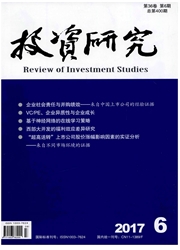

 中文摘要:
中文摘要:
贷款损失准备金机制度是银行风险管理的重要一环。本文以我国商业银行为研究对象,采用2005-2011年的数据,分别对总样本、上市银行和非上市银行两个子样本进行了实证研究,并由此发现,我国商业银行无论是上市还是非上市,在计提贷款损失准备时都受到当期及未来边际不良贷款率的影响,同时也都以财务经营稳定性为首要考虑因素,存在显著的利润平滑动机以及信号传递动机。但是在资本管理动机方面,我国上市银行的资本管理动机明显,且其资本充足率要求显著地比非上市银行的低。我国上市商业银行保持较低资本充足率的同时,更有动机通过贷款损失准备计提来弥补损耗的资本,同时建立更高额的信贷损失准备缓冲垫。
 英文摘要:
英文摘要:
This study investigates the determinant of loan loss provision based on sample of commercial banks in China. With regression analysis and macro economic situation, this study finds that Chinese commercial banks, whether listed or unlisted, their loan loss provisions are subject to the current non-performing loan rate and the marginal non-performing loan rate, and to the stability of financial operations. The significant profits smoothing motivation and signal motivation are also included in the factor of determinant of loan loss provision. Nevertheless, in the capital management motivation, listed and unlisted banks have differences in behavior. The listed banks' capital management motivation is more obvious than the unlisted bank sample, and its capital adequacy ratio is significantly lower than unlisted banks'.
 同期刊论文项目
同期刊论文项目
 同项目期刊论文
同项目期刊论文
 期刊信息
期刊信息
